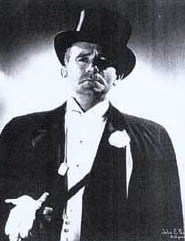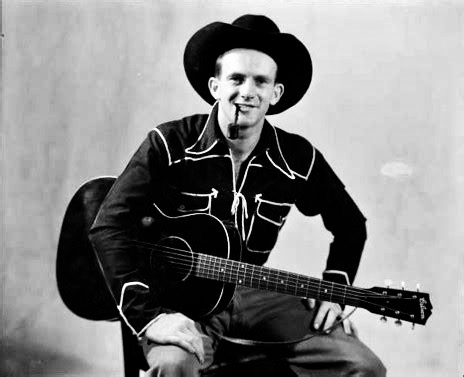Key of C# Capo +1 on guitar and play these chord-shapes.
C F Am C F C G C
C Am C G
Riding down from Queensland on a dirty timber train,
C F A Am G G7 C
We stopped to take on water in the early morning rain,
I saw a hobo coming by, he didn't show much fear,
He walked along the line of trucks, saying any room
in here.
Then I pulled the cover back saying throw your
blankets in,
He dropped his billy and his roll and socked me on
the chin.
They took me to the jailhouse, they got me in the
cells,
I realised then who he was, it was not hard to tell.
Chorus
I wish that I was
fourteen stone and I was six feet tall,
I'd take a special trip up
north, to beat up Sergeant Small.
I've worked for Jimmy Sharman, and at fighting I'm
no dunce,
But let me see the fellow who can take on five at
once.
Chorus
I wish that I was fourteen
stone and I was six feet tall,
I'd take a special trip up
north, to beat up Sergeant Small.
Sergeant Small
In the 1930s depression years, many men on the dole
were obliged to travel the country searching for work
as they had to collect their dole from different
locations. With virtually no money, there were really
only two ways to effect this travel - by walking or by
jumping a goods train.
There was a constant effort by both the state police
and the railway police to deter these free-travelling
swagmen. Their usual technique was to intermittently
board and comprehensively search trains. Sometimes the
swagmen were arrested and other times they would be
forced off the train in remote areas.
Sergeant Small, a well-known police officer stationed
at Roma in south-west Queensland would kit himself out
as a swagman trying to find some space on a goods
train for himself and he'd surreptitiously approach
each goods wagon and ask if there was any room inside.
Many a concealed swagman would answer back and thus
give himself up.
In 1938, the multi-talented New Zealand country and
western singer then in Australia, Tex Morton, decided
to write a song about Sergeant Small and it got a lot
of airplay. But Sergeant Small's threats to sue
resulted in the song being withdrawn from both
broadcast and sale.
Origins and variations
Morton seems have adapted his story from a 1933 poem
by Terry Boylan,
How
I took the Bait, and Australian folk singers who
can't yodel have combined the verses of Morton and
Boylan to create
this
longer version of Sergeant Small.
Tex Morton
Born Robert Lane, in Nelson in 1916, died Dr. Robert
Morton PhD in Sydney in 1983.
He lived a life of breath-taking
achievement, attaining fortune and fame in several
careers: a recording star (300 songs),
singer-songwriter, stage artist (touring sensation in
North America, Europe, Australasia), circus
entrepreneur, best-selling comic writer, Hollywood
screen actor, and with a Doctorate from McGill
University, a world authority and renowned performer
of hypnotherapy.
A Maori neighbour taught him his first guitar chords
and he became so obsessed with music that, at the age
of 14, (in 1930) he ran away from home and busked on
the streets. When asked one day by the town’s
policemen if his name was Bobby Lane, he noticed a
nearby garage sign that gave the name of ‘Morton’ and
said he was Bob Morton, an entertainer. Morton worked
on various jobs, including one with a travelling
troupe.
Later in 1932, he moved to Australia and worked with
travelling shows, where, in addition to singing, he
worked as a magician, a boxing booth fighter, with
wild animals, and even rode as a Wall Of Death
rider. In 1934, with a repertoire of Australian bush
ballads as well as the early country songs that he had
heard on record, he moved to Sydney. He undertook
whatever jobs he could find, including going to sea as
a stoker. After eventually winning a talent show, he
made his first recordings in February 1936. But he was
broke and returned to New Zealand....

....to
discover his records were selling in their thousands,
and he was a nationally known star! By 1939 he was
traveling with his own circus/rodeo, where apart from
singing, he entertained with trick shooting, fancy
riding, a memory act and magic.
In 1949, Morton decided to move to the USA, having by
then learned an act using hypnotism as well as his
other talents. After spending two years as a singer
and actor, he began to appear as The Great Doctor
Robert Morton - the World’s Greatest Hypnotist. In
1951, he toured the USA and Canada with his one-man
show on which he sang, did recitations, trick
shooting, mind reading and hypnotism. He proved so
popular that he set attendance records in many cities.
He returned to Australia in 1965 and appeared on
television and in Australian films, and although he
often tried to leave out the old hillbilly and
yodeling songs, the public would not let him. It is
estimated that during his long career he recorded over
1,000 songs and had many major national hits.
More.


 ....to
discover his records were selling in their thousands,
and he was a nationally known star! By 1939 he was
traveling with his own circus/rodeo, where apart from
singing, he entertained with trick shooting, fancy
riding, a memory act and magic.
....to
discover his records were selling in their thousands,
and he was a nationally known star! By 1939 he was
traveling with his own circus/rodeo, where apart from
singing, he entertained with trick shooting, fancy
riding, a memory act and magic.